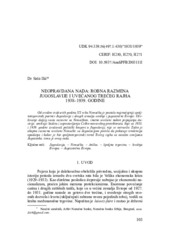Neopravdana nada - robna razmena Jugoslavije i uvećanog Trećeg rajha 1938-1939. godine
Unwarranted hope: Trade between Yugoslavia and the expanded Third Reich 1938-1939
2020
Преузимање 🢃
Чланак у часопису (Објављена верзија)
CC BY
Метаподаци
Приказ свих података о документуАпстракт
Od sredine tridesetih godina XX veka Nemačka je postala najznačajniji spoljnotrgovinski partner Jugoslavije i drugih zemalja srednje i jugoistočne Evrope. Očekivanje daljeg rasta razmene sa Nemačkom, znatno uvećane nakon pripajanja Austrije, aneksije Sudeta i uspostavljanja Češko-moravskog protektorata, koje su 1938. i 1939. godine izražavali politički krugovi u Jugoslaviji, nije se ostvarilo. Zašto je ukupna razmena uvećane Nemačke sa Jugoslavijom počela da pokazuje tendenciju opadanja i kakav je bio spoljnotrgovinski trend Trećeg rajha sa ostalim zemljama Jugoistoka, tema je ovog rada.
During the 1930s Germany became the most important economic partners of Yugoslavia and other countries of Central and Southeastern Europe. Economic domination led to the spread of political influences. Yugoslavia, as an exporter of food and raw materials and an importer of finished products, did not enter the German orbit unreservedly, but over time its capacity for independent action weakened. After Germanys announced territorial expansion, the pragmatic Yugoslav political leadership hoped that this would boost economic cooperation. However, the annexation of Austria, the Sudetenland and the Czech-Moravian Protectorate to Germany (1938-1939) did not lead to an increase in trade with Yugoslavia. Just the opposite, the trade declined due to German appropriation of the economic resources of the annexed countries, the general decline of German exports, the decline in Yugoslav exports (especially corn, whose surpluses were consumed), recession, and Yugoslavias latest attempt to increase tr...ade with Western countries, especially Britain.
Кључне речи:
Srednja Evropa / spoljna trgovina / Nemačka / Jugoslavija / Jugoistočna Evropa / anšlus / Yugoslavia / Southeast Europe / Germany / foreign trade / AnschlussИзвор:
Anali Pravnog fakulteta u Beogradu, 2020, 68, 3, 103-128Институција/група
Pravni fakultet / Faculty of Law University of BelgradeTY - JOUR AU - Ilić, Saša PY - 2020 UR - https://ralf.ius.bg.ac.rs/handle/123456789/1783 AB - Od sredine tridesetih godina XX veka Nemačka je postala najznačajniji spoljnotrgovinski partner Jugoslavije i drugih zemalja srednje i jugoistočne Evrope. Očekivanje daljeg rasta razmene sa Nemačkom, znatno uvećane nakon pripajanja Austrije, aneksije Sudeta i uspostavljanja Češko-moravskog protektorata, koje su 1938. i 1939. godine izražavali politički krugovi u Jugoslaviji, nije se ostvarilo. Zašto je ukupna razmena uvećane Nemačke sa Jugoslavijom počela da pokazuje tendenciju opadanja i kakav je bio spoljnotrgovinski trend Trećeg rajha sa ostalim zemljama Jugoistoka, tema je ovog rada. AB - During the 1930s Germany became the most important economic partners of Yugoslavia and other countries of Central and Southeastern Europe. Economic domination led to the spread of political influences. Yugoslavia, as an exporter of food and raw materials and an importer of finished products, did not enter the German orbit unreservedly, but over time its capacity for independent action weakened. After Germanys announced territorial expansion, the pragmatic Yugoslav political leadership hoped that this would boost economic cooperation. However, the annexation of Austria, the Sudetenland and the Czech-Moravian Protectorate to Germany (1938-1939) did not lead to an increase in trade with Yugoslavia. Just the opposite, the trade declined due to German appropriation of the economic resources of the annexed countries, the general decline of German exports, the decline in Yugoslav exports (especially corn, whose surpluses were consumed), recession, and Yugoslavias latest attempt to increase trade with Western countries, especially Britain. T2 - Anali Pravnog fakulteta u Beogradu T1 - Neopravdana nada - robna razmena Jugoslavije i uvećanog Trećeg rajha 1938-1939. godine T1 - Unwarranted hope: Trade between Yugoslavia and the expanded Third Reich 1938-1939 EP - 128 IS - 3 SP - 103 VL - 68 DO - 10.5937/AnaliPFB2003111I UR - conv_3393 ER -
@article{
author = "Ilić, Saša",
year = "2020",
abstract = "Od sredine tridesetih godina XX veka Nemačka je postala najznačajniji spoljnotrgovinski partner Jugoslavije i drugih zemalja srednje i jugoistočne Evrope. Očekivanje daljeg rasta razmene sa Nemačkom, znatno uvećane nakon pripajanja Austrije, aneksije Sudeta i uspostavljanja Češko-moravskog protektorata, koje su 1938. i 1939. godine izražavali politički krugovi u Jugoslaviji, nije se ostvarilo. Zašto je ukupna razmena uvećane Nemačke sa Jugoslavijom počela da pokazuje tendenciju opadanja i kakav je bio spoljnotrgovinski trend Trećeg rajha sa ostalim zemljama Jugoistoka, tema je ovog rada., During the 1930s Germany became the most important economic partners of Yugoslavia and other countries of Central and Southeastern Europe. Economic domination led to the spread of political influences. Yugoslavia, as an exporter of food and raw materials and an importer of finished products, did not enter the German orbit unreservedly, but over time its capacity for independent action weakened. After Germanys announced territorial expansion, the pragmatic Yugoslav political leadership hoped that this would boost economic cooperation. However, the annexation of Austria, the Sudetenland and the Czech-Moravian Protectorate to Germany (1938-1939) did not lead to an increase in trade with Yugoslavia. Just the opposite, the trade declined due to German appropriation of the economic resources of the annexed countries, the general decline of German exports, the decline in Yugoslav exports (especially corn, whose surpluses were consumed), recession, and Yugoslavias latest attempt to increase trade with Western countries, especially Britain.",
journal = "Anali Pravnog fakulteta u Beogradu",
title = "Neopravdana nada - robna razmena Jugoslavije i uvećanog Trećeg rajha 1938-1939. godine, Unwarranted hope: Trade between Yugoslavia and the expanded Third Reich 1938-1939",
pages = "128-103",
number = "3",
volume = "68",
doi = "10.5937/AnaliPFB2003111I",
url = "conv_3393"
}
Ilić, S.. (2020). Neopravdana nada - robna razmena Jugoslavije i uvećanog Trećeg rajha 1938-1939. godine. in Anali Pravnog fakulteta u Beogradu, 68(3), 103-128. https://doi.org/10.5937/AnaliPFB2003111I conv_3393
Ilić S. Neopravdana nada - robna razmena Jugoslavije i uvećanog Trećeg rajha 1938-1939. godine. in Anali Pravnog fakulteta u Beogradu. 2020;68(3):103-128. doi:10.5937/AnaliPFB2003111I conv_3393 .
Ilić, Saša, "Neopravdana nada - robna razmena Jugoslavije i uvećanog Trećeg rajha 1938-1939. godine" in Anali Pravnog fakulteta u Beogradu, 68, no. 3 (2020):103-128, https://doi.org/10.5937/AnaliPFB2003111I ., conv_3393 .


